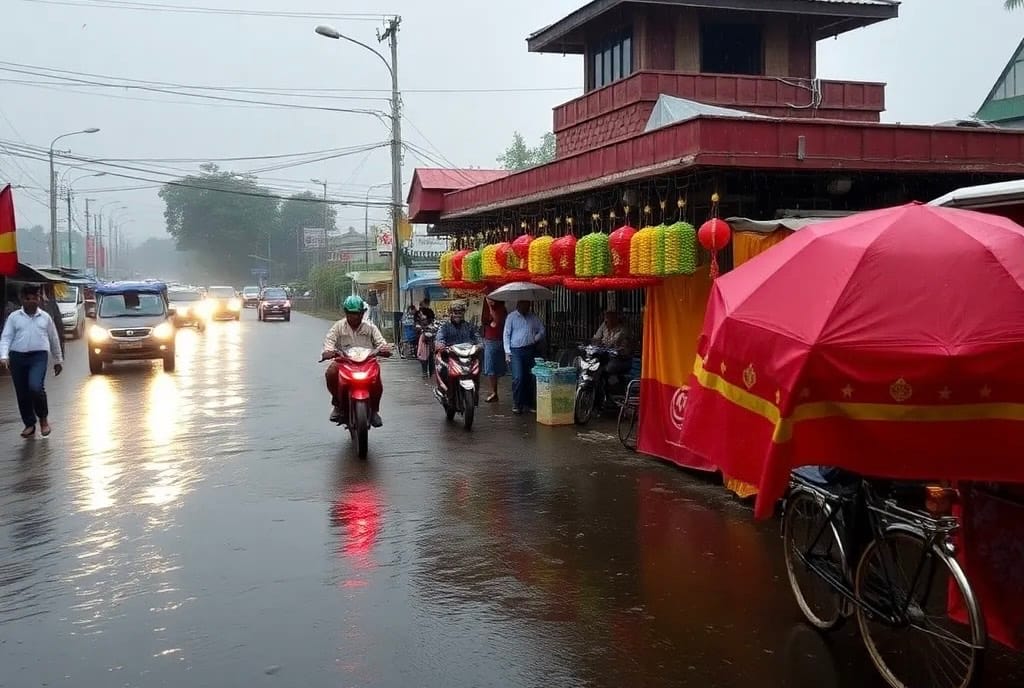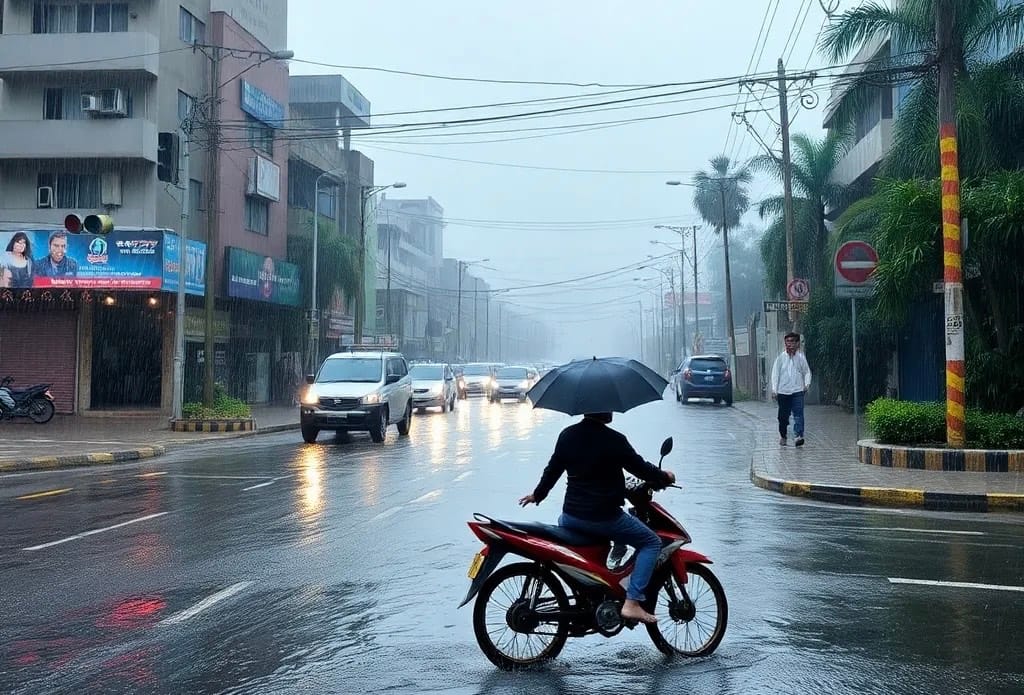As Cyclone Fengal intensifies over the Bay of Bengal, both Chennai and coastal Bengal are on high alert. This powerful cyclone is expected to unleash its full fury in the coming days, with heavy rainfall, strong winds, and dangerous storm surges predicted along India’s eastern coast. While Tamil Nadu’s capital, Chennai, is expected to take the most significant hit, coastal districts of West Bengal may also face severe weather conditions. Authorities in both regions are racing against time to prepare for the cyclone’s impact.
Cyclone Fengal: Current Status
As of 30 November 2024, Cyclone Fengal has strengthened into a severe cyclonic storm, moving west-northwest at a steady speed. The India Meteorological Department (IMD) has forecasted that the storm will likely intensify further, driven by favorable sea temperatures and wind patterns.
Initial projections indicate that the cyclone will make landfall near Chennai, causing widespread disruption. However, the northern Bay of Bengal, including parts of West Bengal, will also experience heavy rainfall, gusty winds, and potential flooding. Coastal districts such as South 24 Parganas and East Midnapore are at particular risk of storm surges.

Expected Impact on Chennai
Chennai is preparing for what could be one of its most severe cyclones in recent years. Heavy rains have already inundated parts of the city, and conditions are expected to worsen as Cyclone Fengal approaches. The IMD has issued a red alert for Chennai, warning of extremely heavy rainfall exceeding 200 mm in some areas, accompanied by wind speeds of 120-140 kmph.
Flood-prone areas such as Velachery, Madipakkam, and T. Nagar are likely to see significant waterlogging, disrupting daily life. Coastal regions, including Marina Beach, may face severe storm surges, potentially displacing thousands of residents. In addition to flooding, strong winds could uproot trees, damage infrastructure, and cause widespread power outages.
Potential Effects in Coastal Bengal
While Chennai is expected to bear the brunt of the cyclone, West Bengal’s coastal districts are also vulnerable. Areas like Sundarbans, Diamond Harbour, and Kakdwip are on high alert. The IMD predicts heavy to very heavy rainfall, which could trigger flooding in low-lying regions and landslides in hilly areas like Darjeeling.
The cyclone’s strong winds may lead to structural damage, particularly in areas where housing infrastructure is weak. Storm surges could inundate coastal villages, posing a significant risk to lives and livelihoods, especially for fishing communities.
Preparatory Measures by Governments
Both Tamil Nadu and West Bengal governments are implementing comprehensive disaster management strategies to mitigate the impact of Cyclone Fengal. Here’s a look at the key measures being taken:
Tamil Nadu’s Preparations:
Evacuations: Thousands of residents from low-lying and coastal areas in Chennai and nearby districts are being moved to safer locations.
Relief Camps: The government has established relief shelters equipped with food, water, and medical supplies to accommodate evacuees.
Infrastructure Checks: Teams are inspecting bridges, flyovers, and drainage systems to ensure they can withstand the cyclone’s impact.
Emergency Services: Fire and rescue teams, along with medical personnel, are on high alert. Electricity boards are deploying teams to restore power quickly in case of outages.
West Bengal’s Preparations:
Fishermen Warnings: Fishermen have been advised not to venture into the sea. Boats and trawlers are being secured.
Shelters and Camps: Temporary shelters have been set up in vulnerable districts to house those evacuated from high-risk zones.
Disaster Response: The National Disaster Response Force (NDRF) and State Disaster Response Force (SDRF) are on standby to assist in rescue and relief operations.
Flood Control Measures: Pumps and drainage systems are being readied to tackle waterlogging in urban areas.
Safety Guidelines for Residents
With Cyclone Fengal posing significant risks, residents in affected areas must follow safety protocols. Below are some essential tips:
For Residents in Chennai:
Stay Indoors: Avoid stepping out unless absolutely necessary.
Protect Your Home: Reinforce doors and windows to withstand strong winds. Move valuables to higher ground to prevent water damage.
Stay Informed: Monitor updates from the IMD and local authorities through official channels.
Emergency Supplies: Keep a stock of essentials like drinking water, non-perishable food, flashlights, and a first-aid kit.
For Residents in Coastal Bengal:
Evacuate When Advised: Follow government evacuation orders promptly and move to designated shelters.
Prepare for Power Outages: Keep mobile phones charged and have backup batteries or power banks.
Stay Away from Floodwaters: Avoid walking or driving through flooded areas to prevent accidents or waterborne diseases.
Secure Livelihood Assets: Fishermen and farmers should secure boats, livestock, and tools to minimize losses.
Community and Volunteer Efforts
In addition to government initiatives, community organizations and volunteers are playing a critical role in preparing for Cyclone Fengal. Local NGOs are coordinating relief efforts, distributing food and essentials, and assisting in setting up shelters. Social media platforms are being effectively used to share real-time updates, safety information, and emergency contacts.

The Role of Climate Change in Cyclonic Activity
Cyclone Fengal’s rapid intensification is part of a broader trend linked to climate change. Warmer ocean temperatures in the Bay of Bengal are contributing to the formation of stronger and more frequent cyclones. Coastal cities like Chennai and regions in West Bengal remain particularly vulnerable to these climatic shifts.
Experts emphasize the need for long-term strategies, such as improved urban planning, better drainage systems, and robust disaster management frameworks to mitigate the impacts of such natural disasters.
Cyclone Fengal is a formidable force that threatens to disrupt lives and infrastructure in both Chennai and coastal Bengal. While governments are doing their best to prepare, individual vigilance and community support remain essential. By adhering to safety guidelines and staying informed, residents can significantly reduce the risks posed by this severe storm.
Let’s prioritize safety and resilience as we navigate through this challenging time.
Check this out: Best Traditional Christmas Food across the Globe

